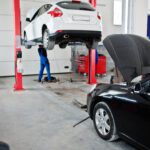Car maintenance is essential for keeping your vehicle running smoothly and extending its lifespan. However, there are a lot of myths and misconceptions about car care that have been passed down over the years. These myths often mislead drivers, causing them to make poor decisions when it comes to maintaining their cars. In this blog, we’ll debunk 10 common car maintenance myths and help you separate fact from fiction.
Table of Contents
Toggle1. Myth: You Should Change Your Oil Every 3,000 Miles
This is perhaps the most widespread myth about car maintenance. While it’s true that oil changes are essential, the 3,000-mile rule is outdated for most modern vehicles. Thanks to advancements in engine technology and improvements in motor oil, many cars can go 5,000 to 7,500 miles (or even longer) between oil changes. Some vehicles, especially newer ones, may even have a recommended oil change interval of up to 10,000 miles. Always check your owner’s manual for the manufacturer’s recommended oil change schedule rather than relying on this general rule.
2. Myth: Premium Gas is Better for Your Car
Unless your car specifically requires premium fuel (for example, high-performance or luxury vehicles), there’s no real benefit to using it in an engine designed to run on regular unleaded. Most cars are engineered to run efficiently on regular gasoline, and using premium fuel will only cost you more without providing any significant improvement in performance or fuel efficiency. Always follow the fuel recommendations in your vehicle’s manual.
3. Myth: You Need to Warm Up Your Car Before Driving in Cold Weather
While it was once a common practice to let your car warm up for several minutes before driving in cold weather, modern engines are designed to run efficiently almost immediately after starting. Idling your car for too long wastes fuel and increases emissions. It’s generally better to start the engine, let it run for a few seconds to ensure oil circulates, and then drive at a moderate pace to allow the engine to reach its optimal operating temperature.
4. Myth: A “Check Engine” Light Always Means a Major Problem
Seeing the “Check Engine” light pop up on your dashboard can be alarming, but it doesn’t necessarily mean your car is about to break down. The check engine light can be triggered by a variety of issues, ranging from something as minor as a loose gas cap to more serious problems like a malfunctioning sensor or engine misfire. It’s important to have your car diagnosed with an OBD-II scanner to pinpoint the issue and determine whether it’s a simple fix or something more severe.
5. Myth: Rotating Your Tires Isn’t Necessary If You Have All-Season Tires
Tyre rotation is an essential part of regular car maintenance, no matter what type of tyres you have. The myth that all-season tyres don’t need to be rotated is simply not true. Tyres wear unevenly, especially with front-wheel drive, rear-wheel drive, or all-wheel drive vehicles, and tyre rotation helps ensure even wear and extends the life of your tyres. Most experts recommend rotating your tyres every 6,000 to 8,000 miles, or as specified in your vehicle’s manual.
6. Myth: Using a Higher Viscosity Oil is Always Better
Some people believe that using a thicker (higher viscosity) oil will provide better protection for their engine, especially in older vehicles. However, using oil with a viscosity that’s too high for your vehicle can decrease engine efficiency and cause more wear. It’s important to use the oil viscosity recommended by the manufacturer, as they’ve designed the engine to work best with a specific type of oil. If you’re unsure, consult your owner’s manual or ask a professional mechanic.
7. Myth: You Can Skip Brake Fluid Changes
Brake fluid doesn’t last forever. Over time, it can absorb moisture from the air, which can reduce its effectiveness and potentially cause corrosion in your brake system. While brake fluid doesn’t need to be changed as often as oil, it’s still an important part of regular maintenance. Typically, brake fluid should be replaced every 2-3 years or as recommended by your vehicle’s manufacturer. Skipping brake fluid changes can compromise your vehicle’s braking performance, which is dangerous.
8. Myth: Bigger Tires Improve Performance
While upgrading your tyres to a larger size may look appealing, it doesn’t necessarily improve your vehicle’s performance. It can have the opposite effect. Larger tyres can increase rolling resistance, decrease fuel efficiency, and affect your car’s handling and speedometer readings. It’s essential to use the tyre size recommended by the manufacturer to maintain optimal performance and safety. If you’re unsure about the right tyre size, consult your vehicle’s manual or speak to a tyre professional.
9. Myth: You Only Need to Replace Your Air Filter When It Looks Dirty
While a dirty air filter can reduce engine performance, waiting until it’s visibly clogged before replacing it is not ideal. Air filters trap dust, dirt, and other debris to prevent them from entering your engine. A clogged air filter can restrict airflow, leading to reduced engine efficiency, poor fuel economy, and increased engine wear. It’s a good practice to replace your air filter at regular intervals—typically every 12,000 to 15,000 miles—or as recommended by your vehicle’s manufacturer, even if it doesn’t look dirty.
10. Myth: Car Washes Scratch Your Paint
Many people avoid car washes because they believe it will scratch their vehicle’s paint, but this is not always the case. Modern automatic car washes are designed to be gentle on your car’s exterior. The real concern comes when people hand-wash their vehicles with dirty sponges or cloths, which can trap grit and cause scratches. If you’re using a professional car wash, especially one that uses high-quality materials and methods, it’s safe for your car. Regular washing is important to keep your car looking good and protect the paint from damage caused by road grime and contaminants.
Conclusion: Make Informed Decisions About Your Car Maintenance
Understanding car maintenance and debunking common myths can help you make better decisions for your vehicle’s health. It’s important to rely on expert advice, manufacturer recommendations, and proven practices to ensure your car runs smoothly and efficiently. Remember, when in doubt, consult your vehicle’s owner manual or a trusted mechanic for guidance. By avoiding these myths and staying on top of your car’s maintenance needs, you can enjoy a safe and reliable driving experience for years to come.
By being aware of these myths, you’ll be able to avoid unnecessary costs and make more informed choices about your car maintenance. Regular upkeep of your vehicle is essential, but knowing what’s fact and what’s fiction is just as important.













